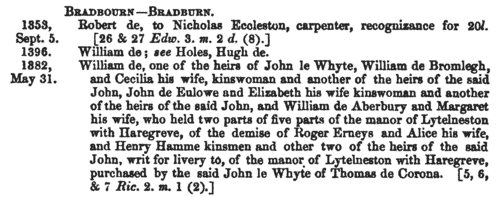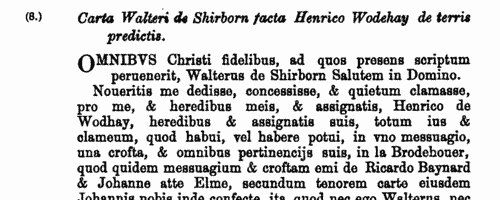Rolleston Surname Ancestry ResultsOur indexes 1000-1999 include entries for the spelling 'rolleston'. In the period you have requested, we have the following 195 records (displaying 11 to 20): Single Surname Subscription | | | Buying all 195 results of this search individually would cost £950.00. But you can have free access to all 195 records for a year, to view, to save and print, for £100. Save £850.00. More... |
These sample scans are from the original record. You will get scans of the full pages or articles where the surname you searched for has been found. Your web browser may prevent the sample windows from opening; in this case please change your browser settings to allow pop-up windows from this site. Grantees of offices, commissions and pardons
(1317-1321)
The Patent Rolls are the Chancery enrolments of royal letters patent. Those for the 11th to the 14th years of the reign of king Edward II (8 July 1317 to 7 July 1321) were edited for the Public Record Office by G. F. Handcock, and published in 1903. The main contents are royal commissions and grants; ratifications of ecclesiastical estates; writs of aid to royal servants and purveyors; and pardons. Most extensive are the commissions of oyer and terminer to justices to investigate complaints about specific crimes and wrongs in particular counties.ROLLESTON. Cost: £2.00.  | Sample scan, click to enlarge

| Charter Rolls
(1050-1326)
This abstract of the surviving charter rolls for 1300 to 1326, in the reigns of kings Edward I and II, was prepared by C. G. Crump and A. E. Stamp and published in 1908. The charter rolls not only recorded royal grants of lands, liberties and offices, but also enabled landowners to have their existing charters, their deeds of title, registered by the process of inspeximus and confirmation. After the Statute of Mortmain of 1279, this was of particular importance to religious houses, now greatly restricted in their ability to receive new donations of land, and anxious to prove title to their ancient property. Consequently, many charters of great age were copied onto the charter rolls.ROLLESTON. Cost: £4.00.  | Sample scan, click to enlarge

| Chancery Warrants
(1244-1326)
Warrants were issued by the kings of England to the royal chancery: most of these warrants led to further proceedings which are recorded on the Charter Rolls, Patent Rolls, Fine Rolls, Close Rolls or the Inquisitions: but archivists have identified a large number of warrants for which there are no such equivalent records, and those for the reigns of Edward I and Edward II are gathered here. Most of the entries relate to England and Wales, but with occasional items referring to Ireland and the English possessions in France.ROLLESTON. Cost: £4.00.  | Sample scan, click to enlarge

| Inhabitants of Leicester
(1103-1327)
The Corporation of Leicester commissioned the publication (in 1899) of extracts from the earliest borough archives, edited by Mary Bateson. This volume brings together several important sources: the borough charters; the merchant gild rolls (from 1196 onwards); tax returns; court rolls (from about 1260 onwards); mayoral accounts, &c. All the Latin and French texts are accompanied by English translations. Membership of the merchant gild was by right of inheritance (s. p. = sede patris, in his father's seat), or by payment of a fee called a 'bull' (taurus). The sample scan shows part of a gild entrance roll; those marked * paid their bull, and were thus, by implication, not natives, or at least not belonging to gild merchant families. By 1400 membership of the gild merchant had become the equivalent of gaining freedom of the borough (being a free burgess): but at this period the two were not necessarily the same, and some of the merchant gild members were not resident in the borough, merely traded there. Not all the tax rolls surviving for this period are printed: but full lists of names are given for a loan for redemption of pontage and gavelpence of 1252-3 (pp. 44-46); five tallages of 1269 to 1271 brought together in a single table (128-145); and tallages of 1286 (208-211), 1307 (255-257), 1311 (272-274) and 1318 (310-313). The portmanmoot (or portmote) was the borough court dealing with minor infractions and civil suits. Finally, there is a calendar of charters (from c.1232 onwards, 381-400), and a list of mayors, bailiffs (reeves), receivers and serjeants (401-407).
ROLLESTON. Cost: £4.00.  | Sample scan, click to enlarge

| Staffordshire entries on the Assize, De Banco and Fine Rolls
(1307-1327)
Extracts of Staffordshire entries from these three series of records for the reign of king Edward II were made by Major-General the Hon. G. Wrottesley, and published by the William Salt Society in 1888. The justices in eyre (itinerant) holding assizes not only tried all civil actions outstanding on their advent, pleas of the crown and common pleas, but also interrogated the juries of each hundred and borough as to the Articles of the Eyre, inquiring into the king's proprietary rights, escheats, wardships, and questions of maladministration. The court of King's Bench (de Banco) sat in Westminster, similarly dealing with court cases brought in from throughout the country. The fine rolls record part of the government administration in England, with orders sent out day by day to individual officers, and commitment of particular responsibilities and duties. Wrottesley's extracts are far from exhaustive, as he confined his attention to those landed gentry families that he considered of importance.
ROLLESTON. Cost: £4.00.  | Sample scan, click to enlarge

| Inhabitants of Cheshire and North Wales
(1320-1329)
The county of Cheshire had palatine status, being in some measure independent of the rest of England: moreover, from the Statute of Wales of 1284, after king Edward I's subjugation of North Wales, until the union of England and Wales in 1536 to 1543, much of the administration of North Wales (county Flint in particular) was directed from Chester. When the Chester Recognizance Rolls were moved from Chester to the Public Record Office, they were placed among the Welsh Records. These rolls, so called because they do include recognizances (of debts &c.) among their contents, are in fact the Chancery Rolls of the palatinate, containing enrolments of charters, letters patent, commissions and other documents issued under the seal of the palatinate. Deeds and other evidences of a private nature were also enrolled on them. A calendar of the Recognizance Rolls from their commencement to the end of the reign of Henry IV was prepared by Peter Turner and included in the 36th Annual Report of the Deputy Keeper of the Public Records in 1875. We have now indexed this, dividing the enrolments into decades. This is the period from the 13th year of the reign of king Edward II to the 3rd year of king Edward III.ROLLESTON. Cost: £6.00.  | Sample scan, click to enlarge

| Fine Rolls
(1369-1377)
The fine rolls of the 43rd to 51st years of the reign of king Edward III record part of the government administration in England, with orders sent out day by day to individual officers, and commitment of particular responsibilities and duties. There is also some material relating to Wales, Scotland, Ireland and the English possessions in France. ROLLESTON. Cost: £4.00.  | Sample scan, click to enlarge

| Fine Rolls
(1377-1383)
The fine rolls of the 1st to 6th years of the reign of king Richard II record part of the government administration in England, with orders sent out day by day to individual officers, and commitment of particular responsibilities and duties. There is also some material relating to Wales, Scotland, Ireland and the English possessions in France. ROLLESTON. Cost: £4.00.  | Sample scan, click to enlarge

| Close Rolls
(1429-1435)
The close rolls of the 8th to 13th years of the reign of king Henry VI record the main artery of government administration in England, the orders sent out day by day to individual officers, especially sheriffs of shires: they are an exceptionally rich source for so early a period. There is also some material relating to Wales, Scotland, Ireland and the English possessions in France. Also included is the Exchange Roll of 1424 to 1434, of licences to transmit sums of money out of the realm.ROLLESTON. Cost: £4.00.  | Sample scan, click to enlarge

| Clerks, clergy, benefactors and tenants of the Hospital of St Nicholas, Salisbury
(1214-1439)
Christopher Wordsworth, Master of the Hospital of St Nicholas in Salisbury, Wiltshire, published an edition of the 15th-century cartulary of that foundation in 1902. While transcribing the text, he interspersed it with notes and lists from his own researches so as to provide a general history of the hospital, and some of the material dates from much later than 1500, and relates to those institutions which he regarded as daughter institutions or offshoots of the hospital. There are later additions to the cartulary through to 1639, and records of the Chapel of St John Baptist on the Isle, the Scotist College of St Nicholas de Vaux (Valle Scholarium), and the collegiate church of St Edmund, Salisbury. There is also a calendar of records belonging to the hospital. The cartulary itself is a quarto codex of 80 leaves, copying charters of bequests to the hospital, and in these the main persons to appear are the benefactors, the witnesses, and occasionally the names of tenants, occupiers of adjoining tenements, and members of the hospital clergy. The cartulary is in six geographical sections: I, Box, Wyvelesford and Manningford Bohun; II, Broad Hinton; III, Fyssherton (Fisherton Aucher or Anger); IV, East and West Harnham; V, Salisbury; and VI, Gerardeston (Gurston in Broadchalke).ROLLESTON. Cost: £4.00.  | Sample scan, click to enlarge

|
Research your ancestry, family history, genealogy and one-name study by direct access to original records and archives indexed by surname.
|












